Horse trainers know that repetition is what gets a horse to learn something, and it is true with people too. We can’t learn to play the piano without doing scales, lots of them.
For the past few years I have been in a state of intense learning. Learning to do bodywork, learning to teach, learning to do and teach Liberty Foundation Training. During this time repetition has been a huge part of my life, and although some repetition can be so boring it can put you to sleep, it is a necessary part of life and learning. I used to think of times tables when I thought of repetition. But it is because of repetition that I know my times tables, even if it was not very exciting to learn them. If I don’t keep doing the same techniques over and over again, I don’t learn to approach them differently, and they don’t become a part of me so I can call on them when I need them.
In our horse training we must repeat a technique over and over again to get it right, so it can become a part of the horse’s being. We as owners and trainers have to do it with them and while we’re doing it, the technique is deepening in us too. There will come a point where we don’t have to repeat it so many times, where it has become embodied and we know it. The horse also knows it and we can rely on his embodied knowledge when we need it.
When a mare teaches her foal when its time to eat and not to eat, she bumps him away from her teat hundreds of times and lets him come back to eat hundreds of times before he learns that respect. So when we introduce the Liberty Foundation Training, unless the foal has been orphaned early, he will know this practice and he’ll soon remember the respect he had learned as a youngster.
Repeating leading from behind, maybe not every day, but frequently, and companion walking, when it feels right, will all stick with the horse and will be activities you share together. You may drop some of them. I notice now, I rarely do leading from behind with some horses, but may do other techniques more frequently.
When I need one of my horses to come out and do some kind of work, or teach in one of my clinics, I know I can count on that horse because he already knows the foundations. It’s in his memory banks. Because it’s a pleasant activity, and on an elemental level, it’s something he knows already with other horses, it doesn’t take long for him to begin doing it.
The foundations are reinforced by other horses too. Being led from behind several hundred times a day by a stablemate or the lead horse deeply embeds this in the horse’s psyche. Sharing territory builds community, gives them all some great comfort from proximity. It’s part of a complex social order that horses rely on. When horses don’t have this in their lives, they can develop social problems, anxiety or depression over time. They need repetition of daily foundations, just as people do. This is also why when you teach something to one horse, very often another horse is watching and will be eager to show that he knows what you taught the first horse. The second horse has learned from watching and usually wants to show off!
On the other end of the spectrum, when we teach these foundations we need to bring some novelty to them sometimes. I need to vary the routine, and I watch to see what interests the horses. For example, sharing territory is a fairly ordinary, sitting exercise where I read a book and sit in the shade while my horse wanders around or grazes. My little grandson Kaiden one day had the brilliant idea to build a fort in the arena where I was working our mare, Jazzmine. Jazzie got so excited by the fort building, and Kaiden was more interested in the construction of his fort. Jazzie was even more interested in him and the fort. She wouldn’t leave him. 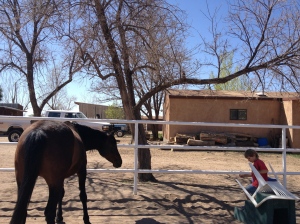
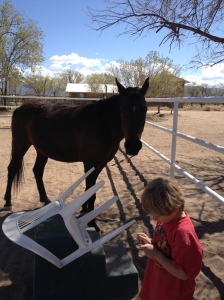
My Arabian gelding, Khami, really likes it if I come in to the corral and clean tack or do some other activity involving tools, particularly power tools. I have no idea why and I know of other horses who also like this.
I still share space in the ordinary way, with a book, a quiet time with me and my horse, but I do vary things once in awhile. I add things in like cones and balls, when I want the horses to have something else to think about like pushing the ball with their noses or legs. The repetitive part of it is we are doing something together, and we are doing it at liberty. There is no real agenda, it is a time of exploration. I’ve added another tool to make it more interesting.
As I am learning to teach, there are techniques I must learn to teach others, and my task is to learn to present them clearly so that others may learn them correctly. I have studied and shown the techniques over and over again and will continue to do so. Each time I do it, it makes me see the technique in a different light, expands my knowledge of it. If I make a mistake, it’s okay, there will be other opportunities to learn it. So my task with Liberty Foundation Training is the same – I want to keep the work interesting and exciting so that the horses want to come back for more. So that when I need them to do something they are interested in the task at hand. Also, because it is repetitive, the people need to be kept engaged with them, find the rhythm of them and why they are so important.
Also when I see horses and people get self-recognition, “aha” moments, I’m pleased because as we all go on this journey, we all have them. It keeps us opening and expanding to have these moments, as we meet new people and horses, and learn new ways of communication. It also helps us bring something rich and new to repetition, so that the repetition is enjoyable and welcome.
Services: Bodywork (Ortho-Bionomy for people, Equine Positional Release/Equine Ortho-Bionomy): private sessions, tutorials, phone consultations, distance healing and gift certificates
Liberty Training: clinics, workshops, private sessions, tutorials, consultations: by appointment: 505.501.2478 or emailing susansmith@orthohorse.info
Now offering “Some Don’t Like It Hot” Liberty Training morning two-three hour-sessions over the summer for two-three people at a time, taking advantage of the cool hours. Tell a friend and get to experience liberty work together!
The upcoming Horses at Liberty Weekend Clinic will be held August 3-4 in Estancia, New Mexico. Cost is $300 Early Bird Discount if you sign up before July 10. After that date the cost will be $350. Liberty Foundation Training. Contact me if interested! susansmith@orthohorse.info
Liberty Foundations Waterhole Rituals Equine Clinic at Spirit Horse Ranch near Oklahoma City, co-teaching: Ruella Yates and Susan Smith. Liberty Horse Training. September 28-29, 2013. Contact Ruella Yates at ruella@libertyfoundations.com, or 405-771-4274.



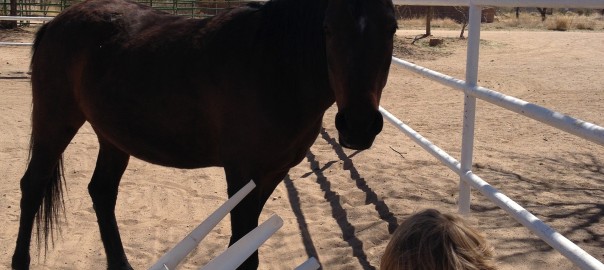
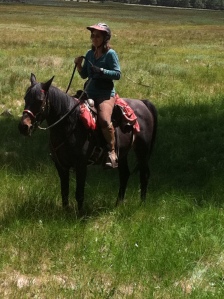
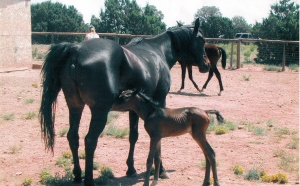
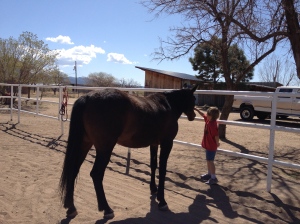
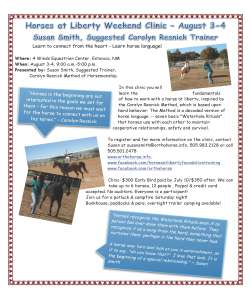
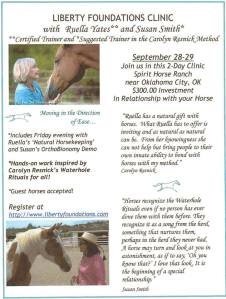
I’d like all my students to read this post, Susan! Fabulous tips for Sharing Territory (with power tools?) and more of the Rituals!
Ruella Yates
Carolyn Resnick Certified Trainer
near Oklahoma City
Thanks, Ruella. I love how the horses get more creative with the rituals and inspire us to do the same!
What a great post! Enjoyed this one immensely. I’m still very new to the WHR so I need repetition and encouragement too. Thanks!
— Kay
Thanks, Kay. I hope to see you at one of my clinics someday! Susan
II love the “variation within repetition” idea here. Our horses can be come so bored that reading a book with them is lovely at times, but building a fort is oh-so-much-fun! Kids just “know” and proceed by instinct if allowed, don’t they? Kaiden obviously hit the nail on the head–good job, Kaiden!